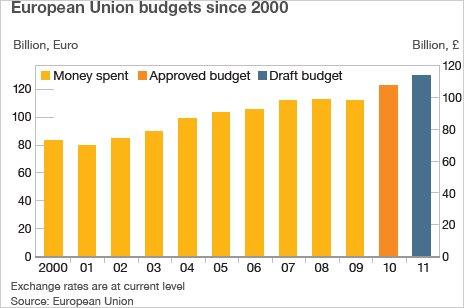EU Commission wants budget raised by nearly 5%
- Published

Farming absorbs the biggest chunk of the EU budget
The European Union's executive arm has asked for a significant increase in the annual EU budget - risking a new row with member states.
The European Commission asked for a 4.9% rise - well above EU inflation, which is about 3%.
The British government said 4.9% was "not acceptable" at a time when EU states were imposing austerity cuts.
The Commission's request for a near-6% rise last year caused a major dispute with the UK and other countries.
After lengthy negotiations the 2011 budget increase was capped at 2.91%.
A 4.9% increase would take the Commission's budget for 2012 to 132.7bn euros (£117bn).
EU Budget Commissioner Janusz Lewandowski described the request as "a delicate balancing act combining austerity and growth-boosting measures for 500 million Europeans".
He insisted the Commission needed to meet spending commitments already made - though he said he expected "tough negotiations" over the size of the budget.
A British government spokesman also suggested negotiations ahead, saying: "A 4.9% increase would not be acceptable to us... We will work very closely with other EU governments to drive the hardest possible bargain."
Rich-poor divide
Last year more than 80bn euros of the budget was allocated to farming subsidies and regional development spending.
The biggest increases in the new budget are for regional development, research, and measures to encourage economic growth, according to Reuters news agency.
With newer, poorer members of the EU receiving the most development spending, the argument over budget increases is often between them and the older, richer nations.
Last year Britain, France and Germany proposed that the EU budget be frozen until 2020, with any increases linked to inflation.
British Conservative MEP Martin Callanan said: "This year we would expect the European Commission to adjust to the mood of austerity that is sweeping the rest of Europe. Every other public sector organisation is cutting back and the EU should do the same."
The European arm of Britain's Labour Party also said it would oppose the increase.
MEP Derek Vaughan said: "We believe that savings can be found to avoid this increase and still put money into areas that are in vital need of EU support."

- Published20 April 2011
- Published17 December 2010
- Published20 December 2012
- Published4 March 2011